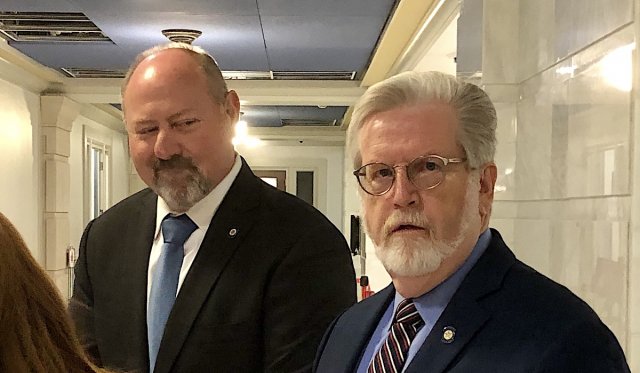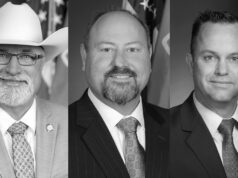

With only a few hours for the public, media and even some lawmakers to review the issues and changes at hand, the House Joint Committee on Appropriations and Budget advanced 40 bills this afternoon related to the state budget, agency spending directions and other policy adjustments.
“There was quite a rush on trying to make sure we got all bills out,” House Appropriations and Budget Chairman Kevin Wallace (R-Wellston) said during the meeting.
Legislative leaders and Gov. Kevin Stitt announced a budget deal Thursday and staff worked through the weekend to draft the bills, which were released late Monday morning, with some language being revealed only shortly before the day’s meetings started. (The Senate JCAB held its own meeting.)
The following offers a description of and link to each bill. The votes noted were from the House JCAB meeting, which lasted about 90 minutes. All measures next move to the House or Senate floors, depending on their chamber of origin.
- HB 2891 removes an exemption for class-size penalties for school districts that have recently passed bond issuances. The bill advanced 32-1.
- HB 2892 adjusts the apportionments of vehicle registration fees to the County Improvements for Roads and Bridges Fund and to the 77 counties of the state, with a portion of financing between July 1, 2021, and June 30, 2026, being determined based on the Oklahoma Department of Transportation’s obsolete and deficient bridges report. The bill advanced 33-0.
- HB 2895 increases from $59 million to $80 million an appropriation for ODOT to make bond interest payments and increases from $575 million to $590 million the apportionment to the Rebuilding Oklahoma Access and Driver Safety Fund starting July 1, 2022. The bill advanced 33-0.
- HB 2896 authorizes the issuance of $200 million in road bonds specifically for projects on the ODOT Construction Work Plan, colloquially called the eight-year plan. (To understand recent controversy regarding the eight-year plan, read more here.) The bill advanced 33-0.
- HB 2897 creates a new fund and sets new limits for fees paid to the Oklahoma Ethics Commission. The bill advanced 33-0.
- HB 2898 redirects monies paid for handgun licenses from an Oklahoma State Bureau of Investigation fund to the state’s General Revenue Fund. The bill advanced 33-0.
- HB 2900 is the general appropriations bill making almost 200 different appropriations to various state agencies. Among a myriad of sections, the bill includes a $6.2 million supplemental appropriation to the Department of Public Safety for mega-centers in Tulsa and Oklahoma City. Additional line items in the Attorney General’s Office budget are aimed at supporting increased costs related to Indian Country reservation legal issues and foreign-owned property issues, particularly related to the ownership of marijuana operations. It also includes $20 million for the governor’s Quick Action Closing Fund and $15 million for the Oklahoma Department of Commerce’s business accelerator program. The bill advanced 28-7 along party lines.
- HB 2902 directs the Office of Management and Enterprise Services to use $1.9 million for the state’s Pay For Success program. The bill advanced 33-0.
- HB 2904 sets line-item budget requirements for the Oklahoma State Department of Health, including a $1 million increase for the Choosing Childbirth program. The bill also requires the hiring of 76 positions with the Oklahoma Medical Marijuana Authority: 62 compliance and enforcement positions, six legal and financial positions, four investigatory officers and four positions for planning and logistical duties. The bill advanced 28-7 along party lines.
- HB 2905 directs that $1.5 million be used to increase funding of the Community Based Youth Services Division of the Office of Juvenile Affairs. The bill advanced unanimously.
- HB 2906 sets line-item budget requirements for the Oklahoma Department of Agriculture, Food and Forestry, including $3 million for the OSU College of Veterinary Medicine and $300,000 for the hiring of additional meat inspectors. The bill advanced unanimously.
- HB 2907 directs that funds from the Oklahoma Conversation be used for the OSU Agriculture Extension Service’s master irrigator program ($90,000) and for that program to study the Ogallala Aquifer ($50,000). The bill advanced.
- HB 2908 sets line item budget requirements for the Oklahoma Department of Corrections, including the use of $8 million to improve the correctional officer-to-inmate ratio and $9.2 million for the treatment of Hepatitis C. The bill advanced unanimously.
- HB 2909 creates the Department of Corrections Offender Management System Revolving Fund for the implementation and operation of an offender management system. HB 2908 directs $9.2 million to be deposited in the new revolving fund. The bill advanced 33-0.
- HB 2910 allows the Department of Environmental Quality, the Oklahoma Tourism and Recreation Department, the State Department of Health, the Oklahoma Tax Commission, the Oklahoma Water Resources Board and the Oklahoma Department of Labor and Mines to establish a Capital Account Fund for the purpose of paying any proportionate share of common area maintenance. The bill advanced 33-0.
- HB 2911 exempts the Oklahoma Department of Tourism and Recreation from allocating 1.5 percent of capital project costs to the Oklahoma Arts Council for the purpose of funding the Oklahoma Art in Public Places Act. The bill advanced 27-7.
- HB 2913 codifies that the administrative director of the courts shall be responsible for and have control over matters concerning the budget, personnel, technology, purchases and other administrative operations of all courts of this state, including the Court of Civil Appeals and the Court of Criminal Appeals, and performing such additional duties as may be assigned by the chief justice. The bill advanced unanimously.
- HB 2944 authorizes the Oklahoma Capitol Improvement Authority to issue obligations to acquire real property and personal property for funding the construction of a new Oklahoma National Guard Museum at a cost of $45 million. The bill advanced unanimously.
- HB 2946 creates a sales tax rebate program for the provision of improved broadband services in underserved and unserved areas. The bill advanced unanimously.
- HB 2949 provides a one-year sales tax exemption for the University Hospitals Trust. The bill advanced unanimously.
- HB 2950 Creates the Ambulance Service Provider Access Payment Program Act. It establishes reporting and assessment requirements and creates penalties for ambulance service providers that fail to pay the quarterly assessments. The bill advanced 33-1.
- HB 2951 creates the State-Tribal Litigation Revolving Fund to be used only for legal services relating to cases and controversies that the Joint Committee on State-Tribal Relations has formally recommended that the state pursue or litigate. The bill advanced 27-7.
- HB 2960 cuts the corporate income tax rate from 6 percent to 4 percent. The bill advanced 27-7.
- HB 2961 cuts the bank privilege tax from 6 percent to 4 percent in conjunction with the corporate income tax cut bill. The bill advanced 27-7.
- HB 2962 cuts all Oklahoma personal income tax rates by 0.25 percent and restores the refundability of the Earned Income Tax Credit. The bill advanced 27-7.
- HB 2963 aligns the prior tax cut measures between state and local tax rates. The bill advanced 28-6.
- SB 1044 moves from the Department of Rehabilitation Services to the Department of Human Services a grant program for supporting the providers of deaf and blind services. The bill also drops the grant program cap from $300,000 to $250,000. The bill advanced 34-0.
- SB 1045 increases the rate within the existing Supplemental Hospital Offset Payment Program by 0.5 percent per year over three years until the final rate is established at 4 percent by calendar year 2024. The bill also grants the Oklahoma Health Care Authority Board — instead of the agency’s executives — additional powers. The bill advanced 25-9.
- SB 1046 sets budget directions for the Oklahoma Health Care Authority: $16.7 million for expanding Medicaid’s dental benefit and $7.6 million for alternative treatments of pain management. The bill also establishes numerous new regulations and directions for the Health Care Authority’s handling and reporting of federal money. The bill advanced unanimously.
- SB 1047 sets line-item budget requirements for the Oklahoma Department of Mental Health and Substance Abuse Services, including $1.5 million for program growth, $500,000 to carry out SB 848’s directives and $2 million to carry out HB 2877’s provisions. The bill also states ODMHSAS “shall increase the amount of crisis intervention training sessions offered to members of law enforcement.” The bill also specifies $2 million to be used for expanding connectivity programs between law enforcement officers, mental health providers and Oklahomans in mental health crisis. The bill advanced unanimously.
- SB 1054 authorizes the Department of Public Safety to spend $439,120 for any necessary expenditures related to interoperable communications inside the State Capitol. It also authorizes DPS to spend $4 million for a trooper academy. The bill advanced unanimously.
- SB 1057 codifies a slew of changes related to driver’s license rules in Oklahoma, including a new fee scale for eight-year renewals. The bill advanced unanimously.
- SB 1067 sets budget details for the State Department of Education. The bill advanced unanimously.
- SB 1073 sets budget limit requirements for the Department of Human Services, including $2 million for decreasing the waiting list for developmental disability services. It also requires DHS to contract with an entity to conduct a survey of those waiting for such services and includes $1 million to be used to fund debt service obligations for the renovation and construction of the Robert M. Greer Center in Enid. The bill advanced unanimously.
- SB 1076 directs the Oklahoma Tourism and Recreation Department to make available matching funds to multi-county organizations that promote tourism. The bill advanced unanimously.
- SB 1078 changes definitions of tobacco products to be in line with federal definitions. The bill advanced 29-5.
- SB 1080 expands the Oklahoma Equal Opportunity Education Scholarship Act to a program cap of $25 million for private school donations and $25 million for public school donations. The bill advanced 28-7.
- SB 1081 directs that $150,000 of appropriations to the Oklahoma Historical Society be used for hiring a grant writer for historically Black towns and $150,000 for schools to provide transportation to the Freedom Center & Clara Luper Civil Rights Center, The Greenwood Historic District and the Oklahoma City National Memorial & Museum. The bill advanced.
- SB 1082 sets budget limit required for the Oklahoma Department of Commerce. The bill advanced 31-4.
- SB 1083 sunsets in 2025 the Oklahoma Capitol Improvement Authority’s ability to issue up to $58.6 million in bonds for funding construction of a new State Health Laboratory for the State Department of Health. The bill advanced 35-0.




















